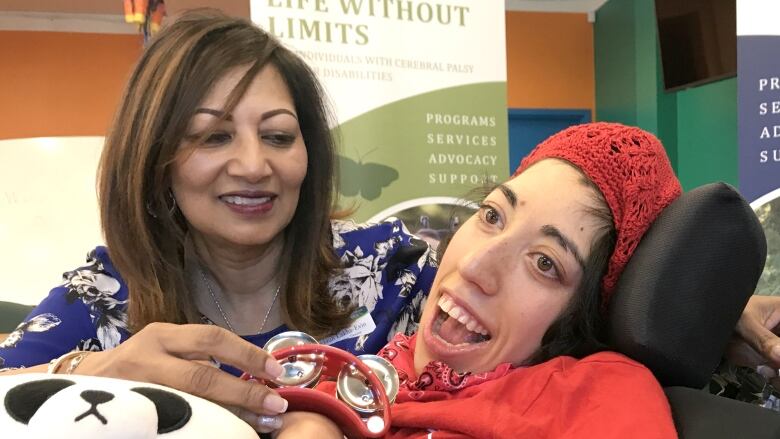Patient groups call for quashing of proposed AHS changes
Proposed program would shift costs for certain medical treatments onto patients

Patient advocacy groups are pushing back against a proposed Alberta Health Services program that would shift costs for certain medical treatments onto patients.
The Standardizing Access to Medications for Ambulatory Patients (STAMP) would set out protocols for certain treatments, including that some drugs and infusions would cease to be offered for free to patients for administration in hospitals.
Instead, patients would have to pay or use private insurance to cover the cost of purchasing the treatment and having it administered.
AHS estimates the program would save $2.3 milliona year if it's adopted.
Some of the treatments under consideration for STAMP are used by cancer patients, people with Crohn's and those struggling with spasticity issues like cerebral palsy.
The Myeloma Alberta Support Society recently sent a letter to the minister of health asking that plans for STAMP be abandoned.
"We urge you to reconsider implementing such a program that will have huge negative consequences for Albertans," it reads.
Myeloma is a type of cancer that affects bone marrow.
The society saidthe kinds of infusions and medications that would be affected by STAMP are treatments that keep people out of emergency rooms.
The letter added that most people with myeloma are seniors, who often struggle to find adequate health insurance.
But there has to be more efficiencies that can be driven rather than putting the cost back to the people living with these diseases.- Lorelei Dalrymple, Myeloma Alberta Support Society
"Having these additional out of pocket costs for treatments that contribute to their overall wellbeing could be untenable for many. For some it could well be a choice between an infusion or buying their groceries."
Lorelei Dalrymple, the president of the society, is going through chemotherapy treatment right now.
She said about 200 people in Alberta are diagnosed with Myeloma each year.
"The biggest concern would be not having the same access to care that we currently enjoy."
AHS previously said Albertans will continue to receive the medications they need.
Dalrymple says that doesn't add up with the design of the program.
"Out of pocket expenses are going to come, whether it's for the actual medications or or for the actual treatment. And so that to me tells me that access is not going to stay the same," she said.
"We need to save money, we need to do better. But there has to be more efficiencies that can be driven rather than putting the cost back to the people living with these diseases."
If infusions are skipped, Dalrymple is concerned there is a risk patients could end up needing emergency room care which is far more costly.
Cerebral Palsy Alberta is also echoing the call to cancel any plans for the program.
"I know there's a cost of doing business and there's a cost for everything out there, but I don't think that this is the way to go about it," Mezaun Lakha-Evin, the associate executive director of the organization, said.
Non-cosmetic Botox is often used to treat muscle spasticity in children with cerebral palsy or other muscular disorders.
The organization saidmany families are already paying hundreds or thousands of dollars out of pocket for treatments and therapies not covered by AHS.
Lakha-Evin estimatedone round of Botox to be around $600. She has used that treatment with her own child.
"Anything that reduces the pain for the ability for children to function is incredible. And any additional cost is not would not be acceptable."
Neither organization was consulted during the development of STAMP.
Patients want a dialogue with AHS
Both want to see AHS, at the very least, facilitate conversations with the patients who will be affected and their families.
The minister of health's office says STAMP is an AHS initiative and while the minister has answered questions in the legislature about it, he has "not indicated any intention to intervene in it."
They added that prescription drugs attained outside of hospitals have always been paid for by patients.
"Patients have always been responsible for the cost of prescription drugs received outside hospitals. That's not new," their statement reads.
"AHS manages a range of clinical settings and over time a range of practices has developed in terms of what's defined as a 'hospital'for purposes of determining when patients pay and when they don't. AHS is looking to make their practices more consistent, based on the existing principle that the publicly funded health system covers prescription drugs in hospital, not in community settings."
In a statement, AHS repeated that a final decision has not been made on the program yet.
"AHS has consulted with physicians, patients and frontline providers as we have considered this new process. We will continue to engage these groups as we refine the process and its potential rollout."
Under STAMP, AHS would continue to cover treatments in certain situations.
They would require the medication to be used to treat an emergency or stabilize acute symptoms, or to be a drug required to be administered in a hospital.
Patients could also have their medications administered in hospital if there is no appropriate alternative setting.












_(720p).jpg)


 OFFICIAL HD MUSIC VIDEO.jpg)
.jpg)



























































































